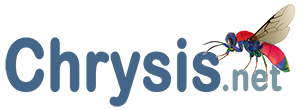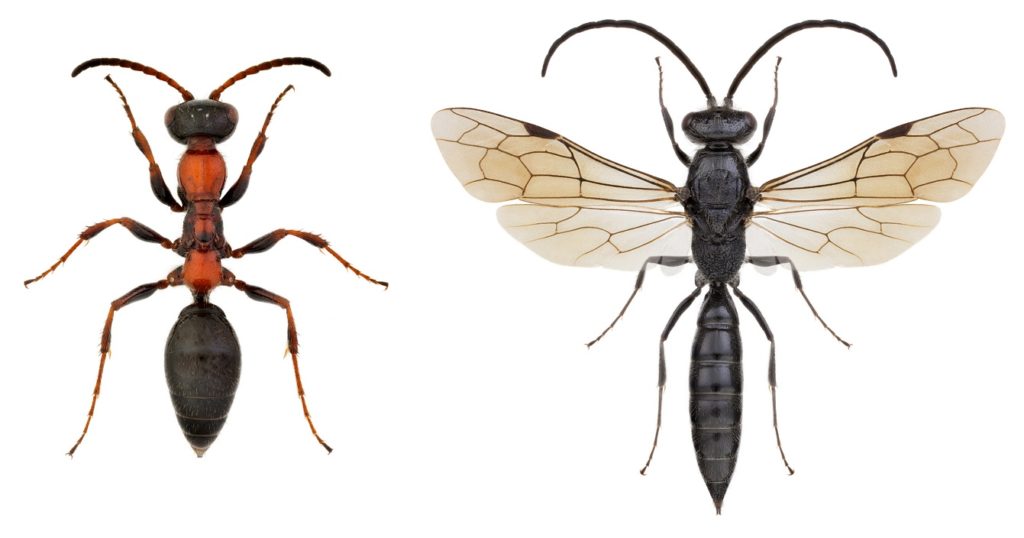Last updated on September 2nd, 2020
Basic morphology of Methocha female
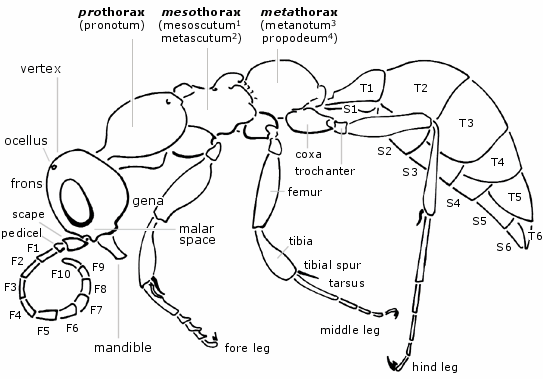
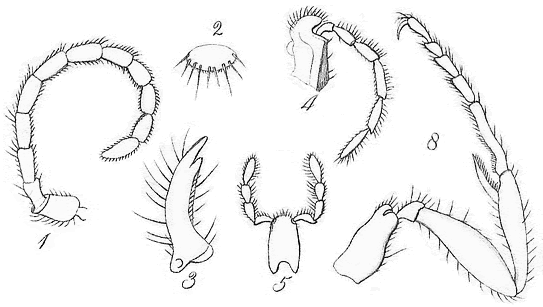
Habitus of Methocha articulata (Latreille, 1792)
Methocha articulata (Latreille, 1792) – female description
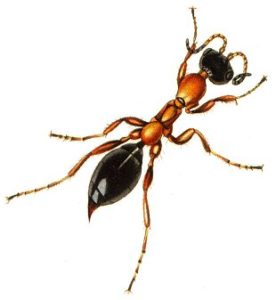
Body slender and antlike, ranging from 3.5 to 9.0mm, with a modal length of about 6.0mm, a shining habitus, usually impunctate or microscopically punctured, with smooth and reflecting interspaces and sparse pubescence.
Head and metasoma black, mesosoma and legs reddish. Forehead convex. Eyes with reduced hair, ocelli present. Antennae composed by scape, pedicel and 10 flagellomeres (= F-I, F-II, etc.) 3-4 times as long as broad, except the first two, reddish in color, the last flagellomeres brownish.
Mesosoma (= the visible thorax, composed by the true thorax and the propodeum) red with three dorsal metameres delimited by two restrictions: prothorax (pronotum), mesothorax (mesoscutum + metascutum) and metathorax (metanotum + propodeum). Mesothorax convex, mesoscutum narrower than pronotum and propodeum; midcoxae completely uncovered; metathorax almost globose, propodeum red. Legs reddish to dark reddish in color and slender; femurs and tibiae elongated and sub-cylindrical; tibiae with only one apical spur; mid- and hindtibia spurs S-shaped, finely combed dorsally.
Metasoma (= the visible abdomen, apart from the propodeum) with six visible terga (= T-I, T-II, etc.), with a constriction between the first and the second tergum, better visible in sternal view.
Methocha latronum (Guichard, 1972) – female description
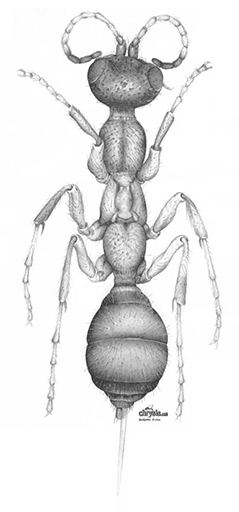
Habitus of Methocha latronum (Guichard, 1972).
The species was established on four small females (3.75-5mm), with hirsute habitus, abundant white hair, overall abundant shallow punctuation; head and metasoma shining black, but, at least in some areas, with rugulosity; clypeus without any tubercle; antennae reddish with pedicel and apical 5-6 flagellomeres darker; mesosoma dull red with propodeal spiracles obscured by rugulosity.
In comparison to the original description (Guichard, 1972), the latronum female from Sardinia (Italy) shows a bigger size (6.5 mm) and a completely mat habitus, without shining reflections.
Compared to the articulata females, the Sardinian female is clearly opaque, with matte, sculptured and densely pubescent teguments; the punctuation on the head vertex shows an average diameter which is double, and it is denser: the single points are interspaced by sculptured areas, rather than the typical smooth ones. The pubescence on the head is longer and denser than in articulata, measuring in latronum up to 4.5 MOD.
The diameter of the punctures on the mesosoma is 1.6 to 2.5 times wider in latronum than in articulata, measuring in the former up to 1.0 MOD, with the pubescence up to 3.7 MOD. The pronotum of latronum shows a deep median depression, wide 1.8 MOD and long 3/4 of the pronotum length; except for the central mesothorax, the interspaces on the rest of the mesosoma are striped and irregularly grooved, not as smooth as in articulata. In both species the punctuation of the metasoma is finer than on the remainder of the body and the respective diameters are not significantly different (0.2-0.4 MOD); however, only few sparse points are visible in articulata and the metasoma appears nearly polished and glabrous, whereas in latronum the points per area are fairly denser, the associated pubescence is dense and long (up to 4.3 MOD) and the interspaces are finely striped with an irregular trend, both on terga and on sterna.
The first gastral tergum is black in articulata, partially reddish in latronum (reddish on the anterior tergal half, entirely reddish in sternal view). S-VI wider in latronum than in articulata.
Comparison between Methocha articulata (Latr.) and Methocha latronum (Guich.)
|
articulata (Latreille, 1792)
|
character
|
latronum (Guichard, 1972)
|
|---|---|---|
|
polished and shiny
|
habitus
|
sculptured and opaque
|
|
sparse and fine
|
punctuation
|
irregular, dense and coarse
|
|
sparse and short
|
pubescence
|
dense and long (up to 4.5 MOD)
|
|
smooth or with weak points
|
interspaces
|
striped and sculptured
|
|
present
|
tubercle on clypeus
|
absent
|
|
convex
|
pronotum
|
convex with a long median depression
|
|
visible
|
propodeal spiracles
|
obscured by rugulosity
|
|
entirely black
|
T-I
|
reddish in the anterior half
|
|
entirely black
|
S-I
|
entirely reddish
|
|
narrow
|
S-VI
|
wide
|
Copyright, Authorship, and Ownership statements
All text and images are copyright ©️ Chrysis.net unless otherwise stated - please see individual cases for authorship and copyright details. The specimens pictured are from the authors' or other collaborators' personal collections and from the collections of various museums. Unless otherwise specified, the whole content of this web site is for personal, non-commercial, scientific, and educational purposes given proper accreditation to the page from which they were derived are provided, and under Chrysis.net Terms and Conditions.
For citation purposes
Agnoli G.L. (2024) Morphology of Methocha wasps, in: Chrysis.net website. Interim version 27 July 2024, URL: https://www.chrysis.net/resources/methocha/morphology/.

